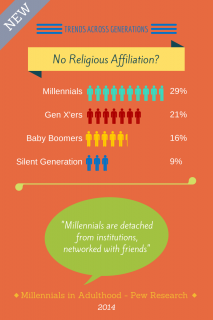What's Up With Millennials? Ask UUs.
By Carey McDonald
Looking for Answers
The Pew Forum’s March 7 report on the Millennial Generation (age 18-33) was yet another poll that highlighted the rising number of young people who are nonreligious. However, Pew’s report also made an important new connection, which is that the decline of religion among Millennials is rooted in the generation’s overall detachment from institutions. As the Director of the Office of Youth and Young Adult Ministries for the Unitarian Universalist Association, and a Millennial myself, I see these generational changes play out every day. In fact, looking at what’s going on in the United States’ 1000 Unitarian Universalist congregations is a great window into the Pew report’s conclusions about generations and institutions.
Pew’s new poll pegs the percentage of religiously unaffiliated Millennials at 29%, compared to a mere 9% of the Silent Generation (age 69-86). It’s a trend that has been confirmed through dozens of studies, and it comes as no surprise to those of us who attend Mainline Protestant, traditional Christian or other congregationalist-style churches where the average member is often in their late 50’s or early 60’s. The poll points out that the number of Millennial atheists continues to grow, though they are still a small minority (11%). Pew’s report further shows my generation is exceptionally liberal on a host of social issues, including support for gay marriage and pathways to citizenship for undocumented immigrants.For religious groups that do not invite questions about the existence of God, or have not supported key social justice issues, these trends might be pretty worrisome. On the other hand, the UUA, is excited about these changes. Unitarian Universalists embrace an open theology that welcomes humanists and nonbelievers alongside committed theists, spiritual seekers and interfaith families. We are prominent advocates of equality for LGBTQ people, and hosted a mass interfaith demonstration in 2012 in support of immigration reform.
It seems that we Unitarian Universalists should be well-positioned to take advantage of these trends to reach out to Millennials. Yet, in reality, our membership is barely staying level, and we have trouble retaining the Millennial youth who grow up in our churches. How could that be? Pew’s report holds the answer.
We UU’s aren’t truly reaching my generation because we haven’t figured how to take the things we love about our churches and translate them into an approach that makes sense for young adults. Far from being an accident, this is a product of our UU congregational model that thrives on members who are culturally similar, economically stable and geographically rooted — all things that are different for the diverse, uncertain and mobile Millennial Generation. No matter how much our UU values match up with those of Millennials, our congregations are institutions in an era that is not very institution-friendly.
Institutions like churches, political parties and social organizations were simply designed for a different era. Pew makes this point crystal clear, linking the increase in the ranks of political “independents” among Millennials with the decline in religious practice to illustrate the challenges all institutions face in trying to attract younger members.
You might say that UU’s are a natural experiment because many of our congregations still have the look and feel of a traditional church but defy the negative stereotypes young adults associate with religion. UU’s are proof that the institutional hypothesis explains what’s going on with Millennials and church. This is not just a theory; it’s a daily reality for the congregations I work with across the country. I see the struggle in adapting a traditional church format with its countless committees, weekly potlucks and Sunday morning services to appeal to younger folks.
Overall, I see great potential down the rocky road ahead for UU’s and religiously liberal people of all kinds. I am glad that the compassion and justice at the heart of my faith is the norm for other people my age, and that the openness and diversity which UU’s cherish is in line with the broader society. But I also know that we with religious leaders stripes must figure out how to create sustainable spiritual organizations in this brave new world if we want our faith to continue to be a beacon of conscience, connection and meaning for decades to come.

